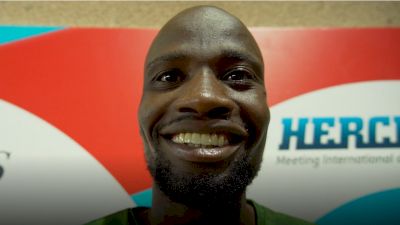After 1:41 In Monaco, The Real Battle Begins Now For Nijel Amos
After 1:41 In Monaco, The Real Battle Begins Now For Nijel Amos
Nijel Amos ran his fastest 800m since the 2012 Olympic final on Friday. Can he ride this 1:41 to his first medal since then?

When an 18-year-old Nijel Amos ran 1:41.73 to finish second to David Rudisha in the 2012 Olympic 800m final, the Botswanan teen appeared to arrive as the heir apparent to the world record holder.
Rudisha’s 1:40.91 at just 23 allowed him to remain the 800m king for the foreseeable future, but the precocious Amos had already entered the Kenyan’s orbit with a five-year age buffer promising a bountiful post-Rudisha prime. At the time, the possibility that the London race would mark Amos’ career high point was a scenario too remote to consider.
But seven years on, the London silver remains Amos’ lone global championship medal, with his transcendent potential dulled by a combination of injuries and mental lapses on the sport’s biggest stages. He did beat Rudisha for 2014 Commonwealth gold, but a lowly fifth place showing at the 2017 World Championships represents his best placing since in a career that, outside of his Olympic glory, has been defined by scintillating times and championship disappointments.
His record at recent major championships:
2015 World Championships: 1:47.36 in semi-final (did not qualify for final); Ran 1:42.66 a month before
2016 Olympics: 1:50.46 in first round (did not qualify for semi-final); Ran 1:44.66 three weeks before
2017 World Championships: Fifth in 1:45.83 (final); Ran 1:43.18 one month before
2018 Commonwealth Games: Eighth in 1:48.45 (final); Ran 1:42.14 three months later
Meanwhile, Rudisha capitalized on Amos’ inability to emerge as his successor. The Kenyan added a world title in 2015 and a second consecutive Olympic title the following year, winning the biggest races of the season despite no longer being the dominant force he was in the previous Olympic cycle. The mantle was there for the taking, but due to either physical ailments or mental ones, Amos missed his chance to snatch it.
The fact that, when healthy, Amos has never stopped running fast, has made him one of the sport’s biggest enigmas. During the regular season, there’s no question that Amos has been the world’s most consistent half-miler for the last half-decade: the Botswanan has ended the year with a top-two time in the world four of the last five seasons, and has won the Diamond League title three times since 2014. But track and field athletes, as in any other sport, are remembered most for what they did in the postseason, and those haven’t been good memories for Amos of late.
In the wake of his electric 1:41.89 on Friday in Monaco, the fastest time in the world since the famous London Olympic final, Amos’ reputation as a time-trial maven and weak tactician will face its ultimate reckoning this fall at the 2019 World Championships. Only two other men in history besides Amos have run under 1:42 more than once-- Rudisha and former world record holder Wilson Kipketer-- and they have a combined seven outdoor global 800m golds between them. For Amos to be truly worthy of his close association to such half-mile royalty, anything short of gold in Doha would be an underachievement.
After Monaco, Amos said his goal for Worlds was just to get on the podium, which, for a man who just ran the first sub-1:42 since “Gangnam Style” was a thing, is a comically soft target that underscores the severity of his championship struggles. For his part, a career spent trying to comprehend why his medal wall is so bare has netted him a keen self-awareness of his primary weakness.
“My mental game is always my biggest opponent [at the championships],” said Amos. “So if I can get my mental game right, I’ll be good.”
It seems likely that Amos has had so much success in Diamond League-type races over the years because he’s been able to turn off his mind and just run. On Friday, Amos chased rabbit and Oregon Track Club teammate Harun Abda through a lightning-quick 48.7 400m--a pace that left a deep field scrambling to hold on--and then just relied on his fitness to carry him to the line. That’s the sort of scenario that carried Amos to his jaw-dropping PB seven years ago, with Rudisha serving as a two-lap pacer for him to chase.
Even if he has to set his own tempo, this is how Amos should race no matter the circumstance. Just gunning it has always been his best recipe for success; it’s when a hesitant championship field tempts him into running with the crowd that Amos gets in his own way.
After Monaco, Amos shared details of an absurd recent workout that he said showed him he was ready to run 1:41. In a 3x350m session with two minutes rest in between each rep, the silver medalist was splitting 34 seconds at 300m, a preposterous time for a mid-distance runner. As far as 800m specialists go, that’s the sort of workout that just David Rudisha in his prime could hang with.
“Everything I did in that session was amazing. I’ve never did [sic] something like this before,” recalled Amos.
Such tantalizing talent has made Amos at times look unbeatable, and the extreme outlier that is his 1:41.89 has by default put him as the favorite for Doha. Rudisha’s world record is probably still a bit out of reach even for him, but there’s no one else on the planet that could even scare it right now.
It’s that superiority to his peers that has made Amos’ championship record so perplexing, and why the former teenage star should take a lesson from Rudisha and let ‘er rip this October at the World Championships like he’s still running in Monaco.